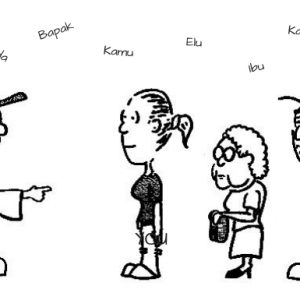Last updated on January 25, 2024
There are some words in Indonesian look familiar to me, and so are pretty easy to learn. In some cases, that is because they are borrowed from English. The spelling is different and the pronunciation changes, but it’s pretty similar.
For example:
- bisnis ‘business’
- stroberi ‘strawberry’
- bebi ‘baby’
- es krim ‘ice cream’
Dutch Words
There are other Indonesian words that look similar to English words, but they are actually borrowed from Dutch. Dutch speakers adopted those words from other languages, and we borrowed some of the same words in English, so they also look familiar. For example:
- institut ‘institute’ from Dutch instituut (but ultimately from Old French and Latin)
- cokelat ‘chocolate’ from Dutch chocolade (but ultimately from Nahuatl)
- kopi ‘coffee’ from Dutch koffie (but ultimately from Turkish and Arabic via Italian)
Sanskrit Words
There are also a lot of words from Sanskrit in Indonesian. A few of these are used in English also, like guru ‘teacher’ and yoga ‘yoga’. Anyone who has studied Romance languages might recognize Portuguese words like pesta ‘party’, sepatu ‘shoe’, mentega ‘butter’ and Natal ‘Christmas’.
Is Indonesian A Creole?
At first, all of these words from different languages gave me the impression that Indonesian is a creole. A creole language evolves when people who do not share a common language want to communicate with each other, so they start taking words from a third language, but use them with different pronunciations and a different set of grammar rules. Some examples of creole languages are Tok Pisin in Papua New Guinea and Pidgin English in Nigeria and Cameroon.
However, this is a common misconception. The history of the Indonesian language goes back to a group of languages from the areas of Borneo and North Sumatra. They are called the Malay languages. These languages are part of the Austronesian family. Indonesian is not a creole. It is a Malay language of the Austronesian family.
Language Contact
So then what about all of those words in Indonesian that do not come from Malay languages? These words were borrowed by Malay speakers who have a long history of language contact with other language groups. Words are borrowed when speakers of one language start using words from another language regularly when speaking their own language.
The history of Indonesian is, in some ways, similar to the history of English. English is a Germanic language that comes from the same ancestors as European languages like German, Dutch and Norwegian. However, English looks very different from these languages in part because English speakers were heavily influenced by French speakers during the period of the Norman invasion in the 11th century. Because of the contact between the two languages, as much as 30 or 40 percent of English words come from French. On top of that, there are also a lot of words taken from Greek, Latin and many other languages.
Is Borrowing Words a Sign of Linguistic Defect?
Borrowing words is not a sign of any linguistic defect. It is natural response to the need to express new concepts. Rather than weakening a language, borrowing actually strengthens it. It is a big part of what has allowed English and Indonesian to become major languages of the world used daily by millions of people. By the way, it turns out that English has borrowed a few words from Indonesian languages too, for example, orangutan, paddy and the word in the expression “to run amok”.
Further resources on Language Contact:
Beginner:
A video on Borrowed Words in English.
Intermediate:
A video on Language Contact by The Virtual Linguistics Campus.
Advanced:
A talk by Peter Trudgill on Languages in Contact and Isolation at Cambridge.
About the author: As a linguist, Joseph Lovestrand is mostly interested in studying indigenous languages, and seeing what they have to tell us about how we communicate, think and live. His research began in Africa. He lived for a year in Chad, studying the Barayin language in order to help them establish their first ever literacy program. He also spent four years working in Cameroon where he managed projects supporting indigenous language communities and did field research on the Nyokon language. His most recent linguistic work has been in Indonesia, where he has consulted on a literacy program for the Kodi language in Sumba. Read more at: www.josephlovestrand.com

